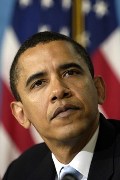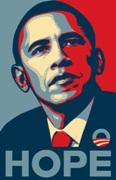
 (This is the 8th in a series of posts on Fairey v. Associated Press. See below for other posts in the series.)
(This is the 8th in a series of posts on Fairey v. Associated Press. See below for other posts in the series.)
I’ve been too busy to blog recently about the Hope poster case, but aside from the AP’s answer to Garcia’s claims of ownership, not much has happened. And frankly, given my schedule, I was hoping it would stay that way for a while.
No such luck. AP just issued a press release on recent developments in the case—and it’s a bombshell. It starts off slow, as though the AP was just tendentiously describing some deposition testimony. But then it gets to this:
Fairey’s counsel has now admitted that Fairey tried to destroy documents that would have revealed which image he actually used. Fairey’s counsel has also admitted that he created fake documents as part of his effort to conceal which photo was the source image, including hard copy printouts of an altered version of the Clooney Photo and fake stencil patterns of the Hope and Progress posters. Most recently, on October 15th, Fairey’s counsel informed The AP that they intended to seek the Court’s permission to withdraw as counsel for Fairey and his related entities.
Whoa!
Don’t believe the AP? Fairey’s lawyers—the Stanford Law School Center for Internet and Society and the new firm of Durie Tangri LLP—have filed a motion to amend Fairey’s complaint and answers that says much the same thing. (The legal ethics of a filing like this are delicate, to say the least; but impossible to fully assess without knowing what transpired between lawyers and client. All I can say is that October 2—the day all this apparently came to light—must have been a very stressful day for Fairey’s counsel.)
To bring everyone up to speed here, one aspect of this dispute that has been argued about since the beginning is which photo Fairey actually used to create his poster. Two photos from the same event, both taken by photographer Mannie Garcia, have been cited: the AP claimed the source was a headshot of Obama, much like the poster; Fairey claimed in his complaint that it was a different photo, with George Clooney also in the frame, which he then cropped. This had some modest amount of significance because if Fairey cropped the photo, that aids his case because the cropping would reflect Fairey’s creative choice rather than Garcia’s.
But really, it was a minor issue; certainly not worth fabricating evidence over. I looked at this issue more closely in a blog post in February, shortly after the filing of the complaint, in which I compared overlays of the poster on the two photos and concluded that Fairey’s claim was “highly implausible”:
Perhaps Fairey has just had a memory lapse. But if not, and he’s engaged in a little retroactive wishful thinking, it’s not for very much benefit; I think the strongest arguments in his favor have nothing to do with the framing of the original photo. Furthermore, to the extent a judge or jury comes to the same conclusion, it just plain looks bad to have a misstatement like this in the complaint.
That’s true—and it looks even worse if you destroy evidence to cover it up. And it looks even worse than that if you manufacture evidence. All for very little benefit. Fairey’s behavior here reminds me of insider trading cases where some billionaire risks prison in order to avoid a loss of $20,000.
It’s also too bad for us copyright professors who were interested in the doctrinal issues here. I can’t see this case going much farther, and even if it does, the chances we’ll get a clean holding on fair use, copyrightability, or substantial similarity seem thin.
[Cross-posted at Madisonian.net]
Other posts in this series:
- Why did Fairey file in the Southern District of New York?
- Does AP actually own the copyright in the Garcia photo?
- Is Fairey’s suit doomed to fail before it even gets off the ground?
- What’s the “original” photo?
- What does the complaint say about the poster creation process?
- The AP strikes back
- What’s a “visual reference”?
- Mannie Garcia joins the suit
- Fairey’s spoliation bombshell—This post

Wow, awesome article. I don’t know that I expected that much in-depth coverup coming from the Fairey party. Thats pretty intense.
Declaratory judgment is an action in equity. Looks like Mr. Fairey’s hands are covered in unclean pixels.
Link to BBC story regarding settlement and new litigation against poster retailers:
http://www.bbc.co.uk/news/world-us-canada-12720159
Thanks Charlie; I just received word that the AP settled the case, which was still pending, against Fairey’s clothing label, Obey Clothing. Press release here.
The BBC has reported on Mr. Fairey’s sentencing.
http://www.bbc.co.uk/news/world-us-canada-19522210